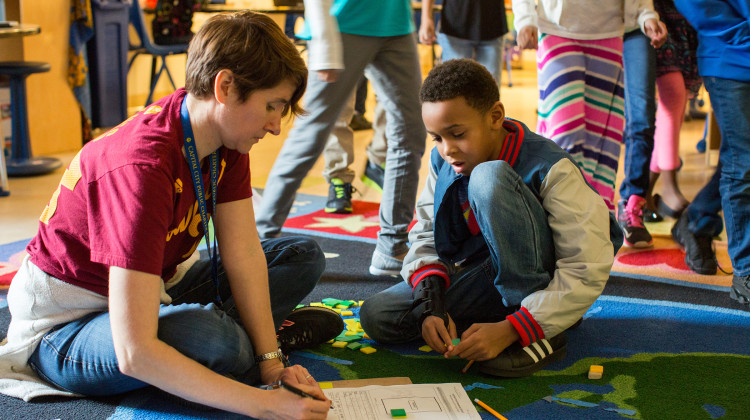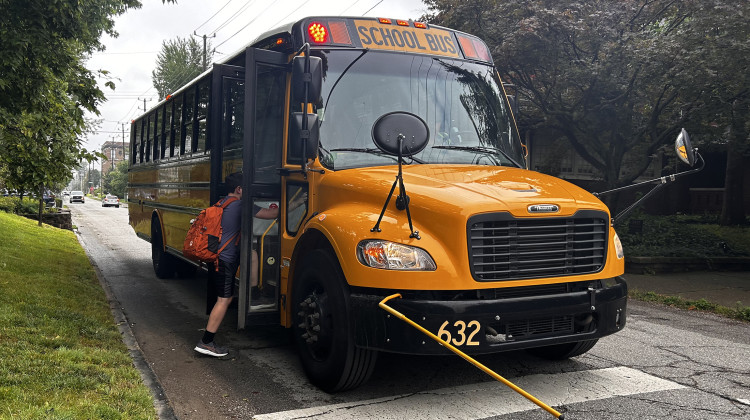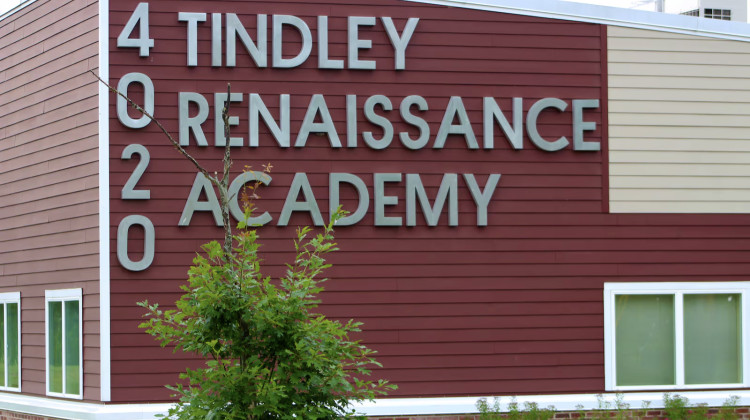
English teacher Melody Coryell speaks to Shortridge High School students after receiving the $25,000 Milken Award from Jane Foley, senior vice president of the Milken Educator Awards (left) and Indiana state Superintendent Glenda Ritz (right).
Scott Elliott / Chalkbeat IndianaIt might not seem like Shortridge High School junior Samantha Jones learned much about writing from working on a year-long sewing project, but with the guidance of a national award-winning English teacher, maybe she did.
The connection between sewing and writing might not be immediately clear. But the center of today’s celebration, Melody Coryell, liked the comparison between stitching a dress and weaving a narrative.
Standing in the school gym as a pep rally in her honor wrapped up — with the band still tapping drums, dignitaries standing by and reporters packing up their gear — Coryell reflected on her dual roles as an English teacher and as project adviser for Jones’ year long effort that produced a ball gown she made by hand.
In both cases, Coryell said, “it’s about allowing kids to dream and being open to their ideas.”
The Milken Family Foundation has conducted annual national searches for top teachers since 1987, handing out cash prizes to more than 2,600 educators. The organization does not accept nominations or disclose how it selects the winners.
It also doesn’t warn the winners in advance for the award sometimes called "the Oscars of teaching.”
So Coryell was sitting in the bleachers with her students when suddenly her name was called and she was handed a $25,000 check. When a reporter asked her what she would do with the money, Coryell suddenly looked up with delight, saying she had just realized she could use the money for a down payment on a new home.
“That’s probably what that is right there,” she said with a laugh, holding up the check. “I just thought of that right now.”
Melody Coryell speaks as some of her Shortridge High School students stand behind her.
Coryell grew up in Kokomo where she said her path to teaching was partly inspired by her selection into the Project Key gifted and talented program.
“A teacher saw something in me and had me test for that program,” she said. “I was bused across town for the rest of my education and given the best and most creative teachers.”
Even so, Coryell didn’t start out planning to teach high school. She studied English and history at Ball State University with plans to pursue a doctorate but ended up working as an educational researcher for IUPUI.
“I realized I was missing this key component to my life, which was actually working with students face-to-face,” she said.
Coryell transitioned to teaching through a program at Indiana Wesleyan University and taught in Lawrence Township for a decade. She was attracted two years ago to the International Baccalaureate program at Gambold High School in IPS because it used the curriculum for all students, not just high achievers, and followed as the program took over Shortridge this year. Most schools that offer IB do so though premium high school classes, similar to Advanced Placement courses.
In the past few years, Coryell also began chasing another of her dreams: becoming a writer. She recently finished a masters degree in creative writing from Butler University. She is working on a creative non-fiction story about her family’s Appalachian heritage and her childhood in Kokomo.
“As a working writer, I can give them real-world applications and really get inside their heads as writers,” she said. “If you can teach students to tell good stories, it’s applicable across the curriculum.”
Junior Dakayoa Calhoun knew Coryell from Gambold last year. Calhoun’s favorite subject is science — she’d like to be a horticulturalist or botanist. Even so, she recalled the electric feeling she had the first time she walked into Coryell’s English class.
“When she is teaching English, she’s like a whole new person,” Calhoun said. “It’s just like that inner self comes out. She is so inspired with English.”
Coryell’s main strategy for teaching writing is to get her students pushing the pen a lot, and not just when they are working for a grade. She starts off most classes with “quick writes.”
She offers suggested topics, like “write about a time you felt conflicted” or “write about the book character you identify with most,” but students can choose a different topic. The students are free to write whatever they want for three minutes. The quick writes don’t figure into students’ grades.
“What’s most important is letting students write many, many times without that being a final draft,” Coryell said, “or even something that is going to be turned into a final draft, so they can be playful with writing.”
Coryell’s own spirit for experimentation led her to offer to be the project adviser for Jones and two of her friends who were into cosplay — making costumes and dressing up as their favorite fictional characters. Coryell also likes to sew and thought it would be fun to play a different role for her students than just being their English teacher.
But Jones’ original project idea was very ambitious. Among other elements, it was supposed to include pieces that represented armor.
With Coryell’s help the project morphed into a ball gown that still pushed Jones’ costume-making skills to a new level but helped her avoid having to pull off as many difficult sewing techniques.
“I knew from the beginning the idea she had wasn’t going to work, so I just asked her more questions about it,” Coryell said. “We can say to a kid, ‘That won’t work. Don’t do that.’ Or we can say to a kid, ‘What do you think about this? Go try it and let’s see what you come up with.’ ”
Coryell considered that teaching approach for a moment.
“That is what you do in writing,” she said. “You go try it, and on your next draft you try again and just keep going.”
Chalkbeat Indiana is a nonprofit news site covering educational change in public schools.
 DONATE
DONATE














 Support WFYI. We can't do it without you.
Support WFYI. We can't do it without you.